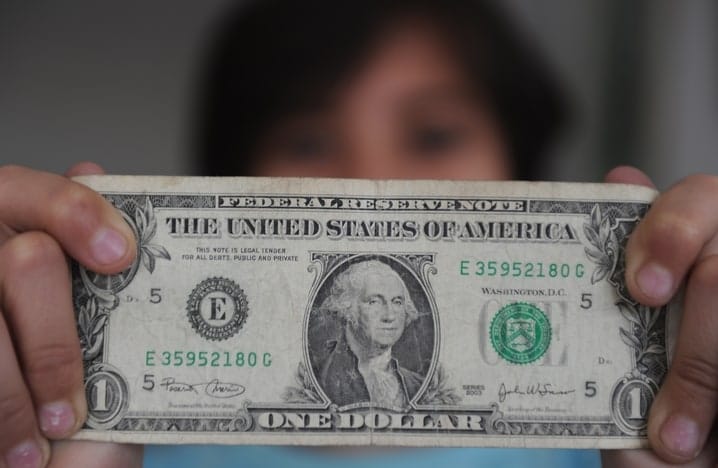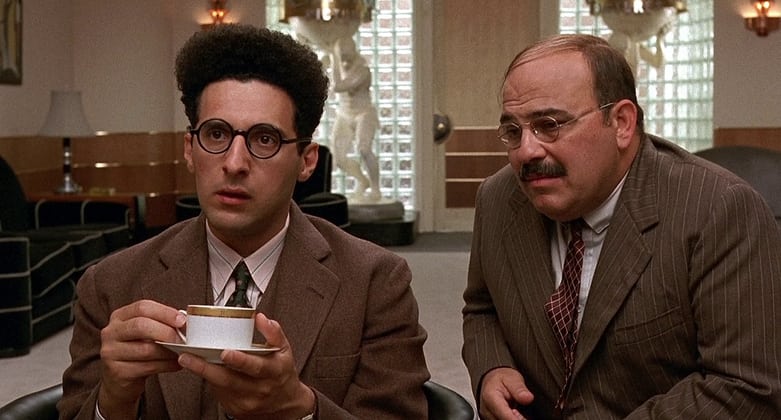Table of Contents
- What is a Screenplay Option?
- Important Points to Know From the Very Beginning
- What About Money?
- Dollar Option on a Screenplay
- How Long Should the Optioning (and Renewal) Period Last?
- What’s Your Role During the Optioning Period?
- How Much Can Your Screenplay Be Changed?
- To Lawyer Up, or Not to Lawyer Up?
- A Screenplay Option – Final Points
So, you’ve written a screenplay and a producer has approached you about a screenplay option. Amazing – right? You’re one step closer to having your work make it onto the screen.
But what do you need to know about the next steps and should you always say yes? Navigating a contract isn’t always easy. And the tricky process of making your work legally protected and engaging in discussions around fees can feel like a major barrier for emerging screenwriters.
So we’ve compiled what screenwriters should know about screenplay optioning…
What is a Screenplay Option?
In simple terms, a screenplay option is when a producer or production company agrees to take your screenplay off the market for a certain amount of time and (hopefully) for a certain price. During this time, they will see if they can develop the screenplay.
- For example, a producer might pay you $1,000 to option your screenplay for a 12 month period.
- If they can’t develop the project within that time, then the rights will lapse back to you.
- But if they manage to further develop the project, for example finding a director, studio or actors, then that initial option will lead to a further development package.
The producer can buy your script for an agreed price at any time within the option period. So the option period is not necessarily the studio/producer/company buying your script. It’s actually the step before that acquisition. An option agreement and a purchase agreement are not the same things. They are, instead, two steps of a process.

Important Points to Know From the Very Beginning
- During the optioning period, the producer owns the exclusive rights to your screenplay. Therefore, your screenplay is completely off the market until the end of the optioning period when the producer will buy it or the rights will return to you.
- DO YOUR RESEARCH. You wouldn’t give your dog to someone to look after for an afternoon if you didn’t know them. So don’t option your screenplay to a person or company you know nothing about. IMBDPro and Google are your best friends here.
- Make sure the optioning opportunity is more valuable and likely to lead to production than keeping your screenplay on the market. At the end of the day, you want your script to be developed. You don’t want your script to languish just for the sake of a quick buck or a panic about no one ever wanting it.
- Make sure you are happy with the details of your contract. And don’t do this in isolation. Speak to those in the know (colleagues, lawyers, agents) and check whether the details of the contract are legit and work for you.
When you’re new to the game, these levels of professional conduct can feel alienating. So it’s always important to take a step back before you rush into anything.
Being offered a screenplay option is sure to be a heady, exciting experience. Therefore, stepping back and analyzing what’s in front of you is key to not making any mistakes upfront when it comes to looking out for you and your screenplay’s best interests.
What About Money?

Your contract should contain two very important numbers:
- Option Price
- Purchase Price
The option price is the initial sum of money offered to acquire the rights and keep the screenplay off the market. This is traditionally 10% of the purchase price. You keep the option fee regardless of whether the interested party ultimately acquires the screenplay.
The purchase price is the amount of money that the producer will pay if they choose to buy your screenplay. When the producer actually pays you the purchase fee, it will usually be less the option price.
So, if the option price was $1000 and the purchase price $10,000, upon the acquisition you would receive $9000.
It’s also important to remember that if you have an agent or a manager, they will receive their 10 – 15% from a screenplay option just as they would for a sale.
OK – but how much should you expect?
Unless you’re a well-known screenwriter or author or one of the highest-paid screenwriters out there – not loads but ideally some. Your screenplay is your intellectual property and you should be compensated for taking it off the market.
When it comes to what you should expect money-wise from a screenplay option, the simple answer is to keep your expectations low. This is especially true when you are a new, emerging writer. Stories of when writers got huge sums for their screenplays (especially in the 1990s, for example) are attractive. And it still happens from time to time.
However, what’s important is that you’re entering into a legal agreement over your work. Don’t let the money distract you at this point. It may come further down the line. But what’s crucial at this stage is that you’re sending your screenplay out into the world in a protected manner.
Dollar Option on a Screenplay

Moreover, on the lower end, we have the well-known $1 options.
“One dollar!?” we hear you say. Is that not a little bit of a slap in the face?
Well to the above points, at this stage, the dollar is really just a transactional requirement to make the screenplay option legal.
Are there any reasons why you should or shouldn’t ever take a $1 option?
| PROS of $1 Screenplay Option | CONS of $1 Screenplay Option |
| It’s an opportunity for a new writer to sell their screenplay. | You don’t want to undersell yourself and your intellectual property. |
| It could be the first step towards a career in screenwriting. | You could be seen as someone who undervalues your work. |
In short, $1 options are sometimes worth it depending on the type of screenplay you are optioning, how much interest you have in it, how many other screenplays you have on the market, and who is offering to option it for $1.
Thousands of screenplays make their way to Hollywood producers, production companies and studios each year. Taking a gamble on a one-dollar option could get your foot in the door. Again, it’s a symbolic move. And it’s important to not get too hung up on the facts of the money. Instead, focus on the symbolic value of your screenplay being legally vouched for.
It’s easy to fall for the idea of selling your screenplay off the bat for a high fee, fist-pumping your way into the sunset. But the reality is that the process of selling a screenplay can be a lot more knotty. However, that doesn’t mean that fist-pumping moment won’t come. It just means that the $1 screenplay option might be the start of a long but ultimately rewarding road.
How Long Should the Optioning (and Renewal) Period Last?

After the optioning period is over, the interested party may renew the time. The terms of this (i.e. length of time and possible renewal fee) should be stated in your contract.
The option period is usually somewhere between 6 and 18 months, with 12 months being the average. The signatory company or individual is then allowed the first option to renew, which is usually around 6, 12 or 18 months long on top of the optioning period.
The option time is intended for the producer/studio to seek to develop the project, using your screenplay as the groundwork. This can be a long and difficult process in and of itself. Hence the existence of a renewal period. The producer/studio may want more time to shop the screenplay around further or wait to hear back from key talent (actors, directors etc).
What’s Your Role During the Optioning Period?
It really depends. You may or may not be asked to pitch meetings. You may be obligated to do rewrites – make sure you check this in your contract and whether you will be paid for this.
In most cases, there’s a lot of waiting for updates. For the budding screenwriter, it’s important to not get too hung up on this waiting period. You shouldn’t be sitting around twiddling your thumbs waiting for someone to get back to you about whether your script is progressing or not. Instead, keep writing and keep moving.
The option may pay off, it may not. But by continuing to write you’re armouring yourself against any of the potential outcomes. You’re generating future potential screenplay options.
How Much Can Your Screenplay Be Changed?

Your screenplay may well feel like your baby, something you have spent years pouring your heart and soul into. It’s only natural to want to see most, if not all, of your work survive and translate onto the screen as you initially envisioned it.
However, actually producing a screenplay is a team effort. Elements in your screenplay are very likely going to change.
You may make some of these changes yourself, as mentioned above, but the producers can also bring in other screenwriters to do rewrites. It is important to be aware of who owns the rights to any rewrites in your contract.
Nothing is concrete. When the screenplay option relapses to you, you have control over what is in there and what isn’t. But during the option period, a producer/studio may decide they want to bring in another writer to have a play around with it.
It’s important to balance standing your ground with being flexible. You want to demonstrate that you are willing to make changes to the screenplay or even have another writer make changes. However, you also don’t want to lose your assertiveness over the project.
To Lawyer Up, or Not to Lawyer Up?
If you can, yes!
You can research all you want, but a trained entertainment attorney will know all of the details and tricks of the trade to get you the best deal possible.
However, make sure you have a good partnership with your lawyer. You don’t want them to ask for too much in an effort to get you the best deal and end up losing the offer.
It may not be necessary to spend the money on a lawyer if you have an agent or manager who is accustomed to negotiating a screenplay option agreement.
- This is one of the key things that a screenwriting agent can and will do for you.
- They’ll have a vast range of experience to draw on when it comes to negotiating these contracts.
- And they’ll also have a good read on the temperature of the industry at large in terms of what typical screenplay options look like.
Again though, it’s important to advocate for yourself. Just because you’ll be deferring to someone with superior knowledge of the industry, doesn’t mean you can’t stand and fight your ground for what you think your screenplay deserves.
Even if you don’t have an agent or manager at this stage of your career, it can be very worthwhile to reach out to one for advice. Say you have been offered a screenplay option but you don’t quite know what you’re looking for; this can be the perfect time to ask an agent for advice.
“Does this look okay to you?” Establishing this kind of relationship could be good for you going forward in your career. But it’s also just helpful to get a second pair of eyes on a document that will prove very important to your screenplay and career development.

A Screenplay Option – Final Points
Navigating a screenplay option, especially as a new screenwriter, can be a tricky process. It feels as if there are multiple different hats to be wearing when approaching and staring down this complicated opportunity.
However, it needn’t be overwhelming. And there are a few key headline elements to remember when faced with a screenplay option:
- Make sure the optioning works for you. For example, make sure you are happy with the option fee, option period and any contractual obligations. Don’t be afraid to say no.
- Get a second opinion, whether this is from your agent or manager or a friend/colleague who might have pertinent experience and advice to give.
- Everything depends on your situation. If you have lots of scripts on the market and want to give a new producer a chance by taking this one off the market for a short period of time, then go for it. It all depends on what you’re looking for.
- Be open to change. Your script will never survive the production process in the form it was when first optioned.
A screenplay option can be an exciting time. But it’s important to keep a level head about what is in essence a business transaction. You’ve put in the hard yards when it comes to writing your screenplay. Now it’s time to take the next part of the journey seriously.
In Summary
A screenplay option is when a producer or production company agrees to take your screenplay off the market for a certain amount of time and for a certain price.
This might also happen for a novel or for the story part of a writer’s screenplay. The producer may obtain the temporary rights for the story for potential adaptation, either to protect it from other producers or to shop around its potential for further development.
The option price is traditionally 10% of the eventual purchase price. The exact fee, however, can vary massively. The lowest can even be $1 – a symbolic purchase more than a practical one.
What did you think of this article? Share It, Like It, give it a rating, and let us know your thoughts in the comments box further down…
Struggling with a script or book? Story analysis is what we do, all day, every day… check out our range of script coverage services for writers & filmmakers.
This article was written by Sophie Bennett and edited by IS Staff.
Get *ALL* our FREE Resources
Tackle the trickiest areas of screenwriting with our exclusive eBooks. Get all our FREE resources when you join 60,000 filmmakers on our mailing list!


Option is ten percent buying price.When you get your options money it is subtracted from the price they purchase it for. Option money is yours whether your script is purchased or not.
‘When the producer actually pays you the purchase fee, it will usually be less than the option price.’
This doesn’t sound right to me. Surely the purchase fee will always be more than the option price..?
Maybe they mean the purchase price less the option price that’s already been paid?
I think they meant to say the purchase price will be minus the option price. $10K – $1K = $9K.